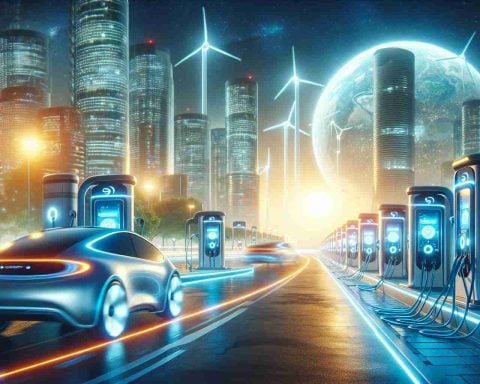West Midlands Drives Forward with Ultra-Fast Charging Stations
The West Midlands is on the fast track to becoming a hub for electric vehicle (EV) charging, with the announcement of three strategic locations for ultra-fast charging stations. These state-of-the-art facilities are set to be operational by next year, featuring 20 chargers at each site. Drivers will be able to charge their vehicles for up to 100 miles in under 15 minutes, a game-changer for EV accessibility.
The first station will be established on Chester Road in Erdington, where it has received outline planning permission as part of an extensive redevelopment of the former GKN factory. This project, driven by Chancerygate, aims to create 270,000 square feet of commercial space for small businesses, potentially generating around 300 new jobs for the community.
Additionally, a second site has been secured on Bristol Road South in Longbridge, near the ongoing redevelopment of the former Rover West Works site. The third location will be situated on Coventry Road in Sheldon, conveniently located by the Solihull and Birmingham border, close to the airport.
Local officials highlight the significance of expanding the availability of charging stations to promote the adoption of electric vehicles among residents and businesses. With this initiative supported by a substantial government investment as part of the City Region Sustainable Transport Settlement, authorities aim to ensure that 90% of the area’s population has easy access to fast charging. This strategic plan is essential to propel the region towards its ambitious goal of achieving net-zero emissions by 2041, fostering a cleaner and greener future for all.
Implications of Ultra-Fast Charging Stations in the West Midlands
The introduction of ultra-fast charging stations in the West Midlands is poised to catalyze significant changes within the region and beyond, reinforcing the push toward a more sustainable future. With EV adoption rates skyrocketing, these strategic installations will not only enhance consumer confidence in electric vehicles but also stimulate economic growth. A study by the International Council on Clean Transportation suggests that every new charging station can promote local investments in EV technology, potentially attracting new businesses and creating jobs in a variety of sectors, from tech startups to retail.
Socially, the expansion of charging infrastructure addresses prevailing concerns about accessibility and energy equity. By ensuring that 90% of the area’s population has access to fast charging, local governments are committed to making electric vehicles a viable option for all residents, regardless of socio-economic background. This inclusivity can significantly alter local commuting patterns, leading to reduced traffic congestion and lower urban pollution levels.
On an environmental level, the West Midlands initiative aligns with global trends advocating for greener technologies. As cities worldwide grapple with rising emissions, the increased use of electric vehicles supported by robust charging networks can contribute to significant declines in greenhouse gas emissions. The ambitious goal of achieving net-zero emissions by 2041 positions the region as a leader in sustainable transport, with the potential to set a precedent that could inspire similar initiatives globally, thereby influencing a shift in the global economy towards sustainability.
West Midlands Sets the Pace for Electric Vehicle Charging Innovations
The Emergence of Ultra-Fast Charging Stations in West Midlands
The West Midlands is making significant strides towards becoming a hub for electric vehicle (EV) infrastructure, spearheaded by the introduction of ultra-fast charging stations across the region. With three strategic locations planned to be operational by next year, these state-of-the-art facilities are set to transform the EV landscape, allowing drivers to gain up to 100 miles of range in less than 15 minutes.
Key Features of the New Charging Stations
1. Location Details:
– Erdington Station: Situated on Chester Road, this station is part of a larger redevelopment of the former GKN factory, which includes 270,000 square feet of commercial space that could create approximately 300 jobs.
– Longbridge Station: Located on Bristol Road South, this station is near the redevelopment of the historic Rover West Works site, a pivotal area for EV growth.
– Sheldon Station: On Coventry Road, this station is strategically placed near the Solihull and Birmingham border, offering convenient access for airport travelers as well.
2. Charging Capacity: Each location will feature 20 ultra-fast chargers, catering to increasing EV demand and enhancing the area’s connectivity.
How This Initiative Will Impact the Region
– Government Support: The local initiative is backed by a significant investment from the government, contributing to the City Region Sustainable Transport Settlement. This funding is crucial for establishing a comprehensive network of chargers.
– Accessibility Goals: With the intention of providing 90% of the local population with access to fast charging solutions, this project aims to facilitate wider EV adoption, which is essential for reducing emissions.
Pros and Cons of Ultra-Fast Charging Stations
Pros:
– Quick charging times enhance the usability of EVs for everyday drivers.
– Job creation through associated commercial developments.
– Bolstering the local economy by attracting small businesses.
Cons:
– Initial infrastructure costs may be high.
– Potential challenges in managing demand and maintenance of charging stations.
Market Trends in Electric Vehicle Adoption
With accelerating trends towards sustainability and net-zero emissions goals, the introduction of ultra-fast charging facilities is not just timely but necessary. The West Midlands is positioning itself to lead in the changing landscape of transportation, aligning perfectly with growing consumer expectations for convenience and efficiency in EV usage.
Future Insights and Innovations
As the West Midlands invests in EV infrastructure, it sets a precedent for other regions aiming to increase EV adoption rates. Future innovations may include smart charging technologies and integration with renewable energy sources, further enhancing the environmental benefits of this initiative.
For more information on electric vehicle policies and infrastructure, visit gov.uk.













